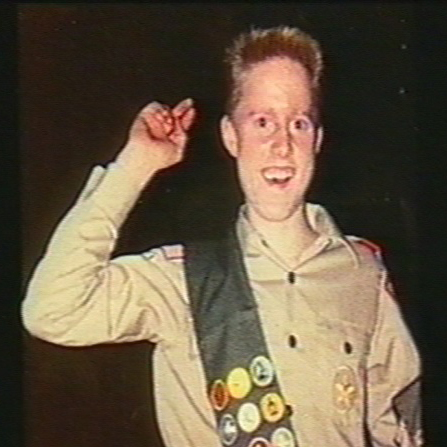David Hahn
“I knew what I was doing wasn't completely right, but I believe it is important to experiment... 'If you don't take risks, you don't do anything. If you don't do anything, you are nothing.'” -David Hahn in The Nuclear Boy Scout

Picture from Frogstorm.com
The Disappearing Spoon presents David Hahn as a troubled mad scientist.
The Nuclear Boy Scout presents Hahn as an innocent, whose good intentions and sharp intellect had unintended consequences.
The Radioactive Boy Scout presents Hahn as some kind of icon of a dying age, the symbol of the broken promises and terrible consequences of the nuclear era, a scientific prodigy seduced by the promises of a science left unchecked by environmental concerns.
David Hahn was truly none of these. In fact, up until the summer of 1995, David Hahn seemed to be an unremarkable teenage boy.
Seventeen years old and an aspiring eagle scout with unexceptional grades, Hahn seemed destined for anonymity. Then, the story broke- this unexceptional boy had created a nuclear reactor, and in the process had endangered not only his own life, but the lives of his neighbors.
Inspired by books such as now-banned The Golden Book of Chemistry Experiments, Hahn used common items such as smoke alarms, a older clock painted with radium paint, thorium hooded lanterns, and rocks that included radium ore, such as what Marie Curie used in her own experiments. While he was always interested in chemistry, it was his quest to earn the Atomic, Chemistry, and General Science Merit Badges that started him on the road to creating a reactor. It had a list of common places to find radiation, a model of a basic reactor, and a guide to making a Geiger counter. With these aids, and '50s and '60s era college textbooks, David Hahn succeeded in creating a nuclear reactor in a backyard potting shed.
Fifty years previously, such a feat would have been hailed as a sign of a scientific prodigy.
Instead, David Hahn was forced to take responsibility for some of the external consequences of his actions. According to Hahn, he believes that “if someone is willing to take some risk out there, if their underlying intentions are good, then sometimes the laws don't always apply.” Unfortunately, the EPA does not agree. The risk David took was not just a risk for himself, but also for everyone he exposed to radiation. The reactor he built was risky, and even had the risk of eventually exploding, becoming in effect a dirty bomb. His lab was dismantled, and because he was believed to have exceeded his maximum lifetime dose of Thorium exposure, he was never allowed to pursue a career in nuclear power. His home became the site of a Superfund clean up site. His work is believed to have put up to 40,000 people at risk. Though Hahn continued to attempt to experiment in nuclear power, going so far as to be brought up on larceny charges in 2007 for stealing smoke detectors, he has never achieved the success he was looking for.
The closest he was able to come to his dream was working as a Seaman on the USS Enterprise.